
House of Cards is a 1990 British political thriller television serial in four episodes, set after the end of Margaret Thatcher's tenure as Prime Minister of the United Kingdom. It was televised by the BBC from 18 November to 9 December 1990. Released to critical and popular acclaim for its writing, direction, and performances, it is considered one of the greatest British television shows ever made.
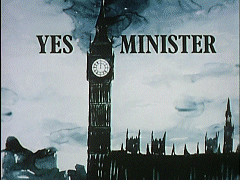
Yes Minister is a British political satire sitcom written by Antony Jay and Jonathan Lynn. Comprising three seven-episode series, it was first transmitted on BBC2 from 1980 to 1984. A sequel, Yes, Prime Minister, ran for 16 episodes from 1986 to 1988. All but one of the episodes lasted half an hour, and almost all ended with a variation of the title of the series spoken as the answer to a question posed by Minister Jim Hacker. Several episodes were adapted for BBC Radio; the series also spawned a 2010 stage play that led to a new television series on Gold in 2013.
A whip is an official of a political party whose task is to ensure party discipline in a legislature.

Michael John Dobbs, Baron Dobbs is a British Conservative politician and author, best known for his House of Cards trilogy.

William Armand Thomas "Tristan" Garel-Jones, Baron Garel-Jones, PC was a British politician. A member of the Conservative Party, he served as the Member of Parliament (MP) for Watford from 1979 to 1997, before being made a life peer in 1997.
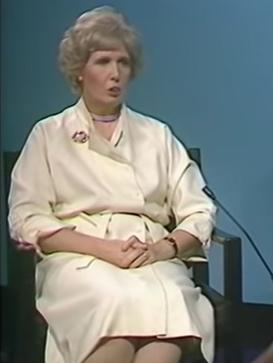
Marcia Matilda Williams, Baroness Falkender, CBE, also known as Marcia Falkender, was known as the private secretary for, and then the political secretary and head of political office to, UK Labour prime minister Harold Wilson.

Aunt Sally is a traditional English game usually played in pub gardens and fairgrounds, in which players throw sticks or battens at a ball, known as a 'dolly', balanced on top of a stick; traditionally, a model of an old woman's head was sometimes used. Leagues of pub teams still play the game, throughout the spring and summer months, mainly in Oxfordshire and some bordering counties. In France, the game is called jeu de massacre.
Colin Abel Jeavons is a British retired actor and TV presenter. He is known for his character roles and has worked in theatre, television and film, especially in literary adaptations and roles related to the works of Charles Dickens. He was born in Monmouthshire, Wales.
Susannah Harker is an English film, television, and theatre actress. She was nominated for a BAFTA TV Award in 1990 for her role as Mattie Storin in House of Cards. She played Jane Bennet in the 1995 TV adaptation of Pride and Prejudice.

The Final Cut is a 1995 BBC television serial, the third part of the House of Cards trilogy. Directed by Mike Vardy, the serial, based on Michael Dobbs's 1994 novel of the same name, was adapted for television by Andrew Davies. It details the conclusion of Francis Urquhart's reign as Prime Minister of the United Kingdom.
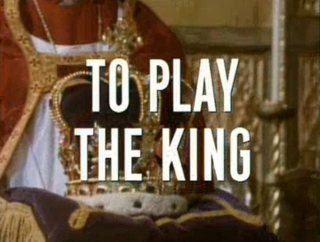
To Play the King is a 1993 BBC television serial and the second part of the House of Cards trilogy. Directed by Paul Seed, the serial was based on Michael Dobbs' 1992 novel of the same name and adapted for television by Andrew Davies. The opening and closing theme music for the TV series is entitled "Francis Urquhart's March", by composer Jim Parker. The series details the conflict between British Prime Minister Francis Urquhart and a newly crowned king as well as the run-up to the general election.
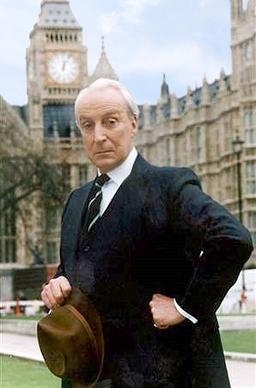
Francis Ewan Urquhart is a fictional character, the villainous protagonist of the 1990 British television series Michael Dobbs' House of Cards trilogy of novels. In the television series, he is portrayed by Ian Richardson, and is a member of the Conservative Party, Urquhart is known to be a ruthless politician who rises from Chief Whip of the Conservative Party to Prime Minister of the United Kingdom through much treachery, deception and murder. He is married to Elizabeth Urquhart, who often persuades him to use a given situation to his advantage.
A political thriller is a thriller that is set against the backdrop of a political power struggle, high stakes and suspense is the core of the story. The genre often forces the audiences to consider and understand the importance of politics. The stakes in these stories are immense, and the fate of a country is often in the hands of one individual. Political corruption, organized crime, terrorism, and warfare are common themes.
Matthew Victor Storin is an American journalist who served as editor of The Boston Globe from 1993 to 2001.
The Chief Whip of the Conservative Party oversees the whipping system in the party, which is responsible for ensuring that Conservative MPs or members of the House of Lords attend and vote in parliament in the desired way of the party leadership. Chief Whips, of which two are appointed in the party, a member of the House of Commons and a member of the House of Lords, also help to organise their party's contribution to parliamentary business.

The Parliamentary Private Secretary to the Prime Minister is a Parliamentary Private Secretary serving the Prime Minister of the United Kingdom. The holder of the office is widely viewed as the Prime Minister's "eyes and ears" on the backbenches, serving as a liaison to the Prime Minister's parliamentary party. The Parliamentary Private Secretary is also responsible for meeting with members of Parliament when the Prime Minister is unavailable, and accompanying the Prime Minister to, and assisting them with preparations for Prime Minister's Questions. They usually sit directly behind the Prime Minister during question time.
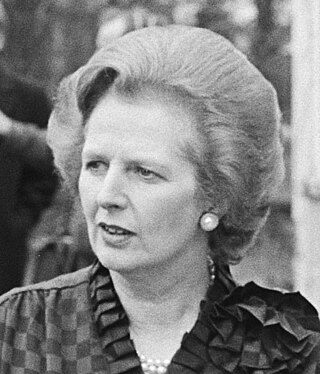
The Gang of 25 or the Group of 25 was a cohort of British Conservative Party backbench members of Parliament (MPs) that threatened to vote against prime minister Margaret Thatcher's 1981 Autumn Statement. The statement contained monetarist measures to control inflation. Similar measures introduced since 1979 had reduced inflation but caused job losses in the manufacturing sector.











